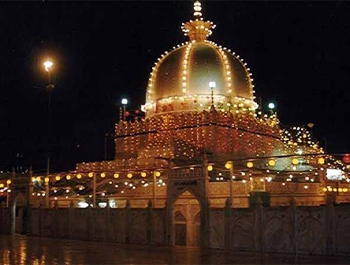
Located in the heart of Rajasthan, the city of Ajmer holds a sacred atmosphere that transcends time and beckons pilgrims from various corners of the world. The Ajmer Ziyarat Tour, centered around the highly revered Dargah sharif, is a spiritual attraction that immerses visitors in the rich tapestry of Sufi mysticism. With this article, we'll embark on a journey through the historical alleys of Ajmer, discovering the spiritual significance, rituals, and divine energy that defines the Ziyarat tour well.
Ajmer – A mosaic of faiths
Historical Foundation: Ajmer's past dates to the 7th century, witnessing the rise and fall of empires. The city's historical significance is intertwined with the establishment of the Ana Sagar Lake by Anaji Chauhan, setting the stage for a town that would become a melting pot of diverse cultures and faiths.
Sufi Presence: The spiritual essence of Ajmer is encapsulated in the Dargah Sharif, the final resting place of Khwaja Moinuddin Chishti, a revered Sufi Saint. Khwaja Moinuddin Chishti played a pivotal role in spreading Sufism in India, focusing on the values of love, peace, and tolerance. His teachings continue to echo through the sacred corridors of the Dargah.
Dargah Sharif – A sanctuary of Divine Energy
Architectural Marvels: With its elaborate carvings and white marble exterior, the Dargah Sharif is a remarkable architectural achievement. The enormous Buland Darwaza (Great Gate) greets travelers with a sense of grandeur as they approach the entryway. The sparkling dome and the towering minarets create a heavenly atmosphere.
Courtyard of the Dargah: As pilgrims enter the Dargah courtyard, they are surrounded by the aroma of incense and a chorus of devotional chants known as qawwals. There's a strong spiritual vibe that makes it feel as though time has stopped. Pilgrims from many origins unite, overcoming caste and religious barriers.
Rituals and Offerings: At the Dargah's sanctum sanctorum, Mazaar-e-Sharif, devotees present prayers, flowers, and chadar, a ceremonial cloth. The custom of tying sacred threads, or kalavas, represents the relationship between the devotee and the saint and is associated with prayers for prosperity and well-being. The Dargah's ritualistic activities combine sincere displays of religion with long-standing traditions.
The Urs Festival – A Grand Celebration
Held every year to mark the anniversary of Khwaja Moinuddin Chishti's death, the Urs festival is a lavish celebration that attracts a sizable crowd of devotees. The Dargah is transformed into a rainbow of color, complete with colorful lights, banners, and decorations.
Grand processions called "Jannati Darwaza" and "Buland Darwaza" are held during the Urs holiday. By taking part in these processions, pilgrims produce a show of spiritual solidarity. The sounds of traditional drumming fill the air, and the pilgrims' devotion fills the streets.
The Urs festival is a cultural spectacle in addition to a religious occasion. Traditional Sufi songs and dances are performed at the Dargah, giving the celebrations a rhythmic beauty. The cultural events give local artists a stage on which to display their skills, fostering a happy and festive atmosphere.
The Spiritual Legacy Beyond the Dargah
The spiritual legacy of Ajmer goes beyond the Dargah Sharif to other Sufi shrines in the city. The holy shrine of Hazrat Khwaja Nizamuddin Chishti, a nephew of Khwaja Moinuddin Chishti, holds immense significance for pilgrims seeking blessing and solace.
The teachings of Khwaja Moinuddin Chishti are not confined to spiritual realms; they extend to education and humanitarian endeavors. The Khwaja Gharib Nawaz Education Trust was established in Ajmer and focuses on providing educational opportunities and welfare initiatives, embodying the Sufi ideals of compassion and service.
Ajmer Beyond the Spiritual Odyssey
Ana Sagar Lake – Although Ajmer is mainly recognized for its spiritual sites, Ana Sagar Lake provides peace. Surrounded by verdant gardens and historically significant buildings, the lake offers a tranquil environment for reflection and leisure.
Adhai Din ka Jhopra – The Adhai-din-ka-Jhonpra, a medieval mosque next to the Dargah Sharif, is a prime example of the architectural blending of Islamic and Hindu forms. For those who enjoy history, the building is a must-see because of its exquisite carvings and historical significance.
Pushkar – Pushkar, another spiritual center noted for the Brahma Temple and the holy Pushkar Lake, is only a short drive from Ajmer. The town's spiritual atmosphere provides a comprehensive pilgrimage experience, balancing the serenity of Ajmer.
Conclusion –
As pilgrims embark on this spiritual journey, they not only witness the architectural marvels of Ajmer but also experience the unifying force of Sufi mysticism. Ajmer's legacy extends beyond its historical monuments; it is etched in the hearts of those who seek spiritual enlightenment and divine blessings. The Ajmer Ziyarat Tour attracts all to partake in a mystical journey where the soul finds resonance in the echoes of centuries-old prayers.